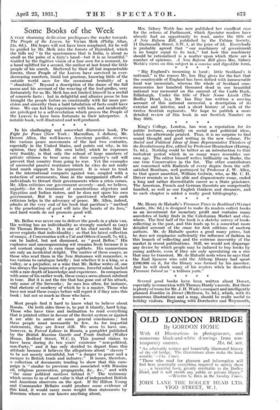Most people find it hard to know what to believe
about Russia. On both sides there is, to put it bluntly, hard lying. Those who have time and inclination to read everything that is printed either in favour of the Soviet system or against it are able to arrive at some general conclusions ; but these people must necessarily be few. As for impartial statements, they are fewer still. We seem to have one, however, in Forced Labour in Russia, a pamphlet published by the British Russian Gazette and Trade Outlook (Walter House, Bedford Street, W.C. 2). This journal claims to have been during its ten years' existence " non-political, non-Party," and it has only decided to depart from this attitude because it believes the allegations about " slavery " to be not merely untruthful, but " a danger to peace and a menace to British trade and industry." It issues, therefore, a collection of documents tending to show that this earn- paign is " similar to previous ones. associated-with Russian oil, religious persecution, propaganda, &c., &c.," and with " the same political motives behind it." The testimony which seems to us of most value is that of independent British and American observers on the spot. If Sir Hilton Young and Commander Bellairs could produce some evidence of this kind, it would carry more weight than statements by Russians whom no one knoWS anything about.
Mrs. Sidney Webb has now published her excellent case for the reform of Parliament, which Spectator readers have already had an opportunity to read, under the title of A New Reform Bill, published by the Fabian Society, 11 Dartmouth Street, S.W. 1, at the price of 2d. Everybody is probably agreed that " our machinery of government is no longer equal to its task," but how this machinery should be rationalized is a matter upon which ,there are a number of opinions. A New Reform Bill gives Mrs. Sidney Webb's views on this subject in a concise and digestible form.






































 Previous page
Previous page